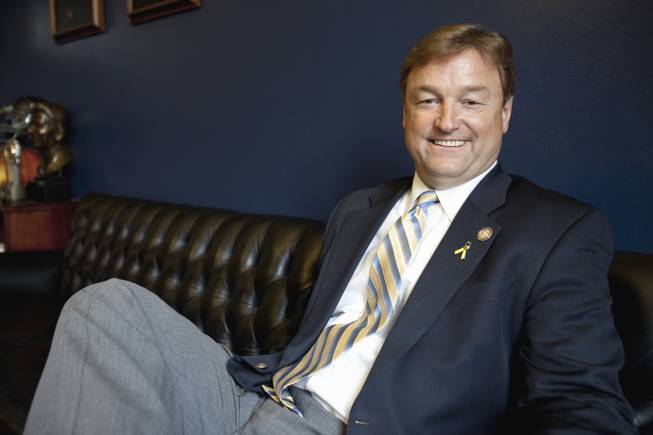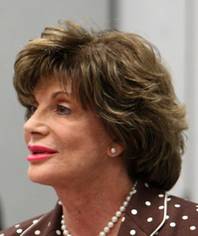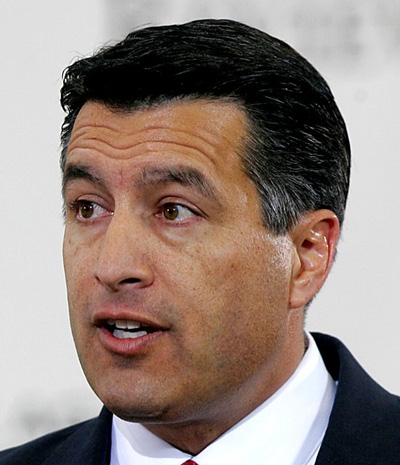
Harry Hamburg / AP
Rep. Dean Heller, R-Nev., is seen in his office on Capitol Hill in Washington on Tuesday, March 15, 2011.
Thursday, April 28, 2011 | 2 a.m.
Governor's statement

Shelley Berkley
Sun archives
- Sandoval chooses Dean Heller for John Ensign replacement (4-27-2011)
- Until the end, John Ensign a master of close-call politics (4-22-2011)
- Heller appointment to Senate changes campaign calculus (4-22-2011)
- Dean Heller could get boost, but can't shake bout with Shelley Berkley (4-22-2011)
- If Dean Heller chosen to replace John Ensign, fallout would be felt down the ticket (4-22-2011)
- Sandoval: Sen. John Ensign replacement will be named before May 3 (4-22-2011)
- Nevada’s special election laws not so clear, probably will result in lawsuit (4-22-2011)
- Sen. John Ensign to resign, Dean Heller likely replacement (4-21-11)
Gov. Brian Sandoval surprised no one Wednesday when he named Rep. Dean Heller as the replacement for the retiring Sen. John Ensign. But just because the appointment was expected doesn’t mean it won’t have far-reaching ramifications.
Here are five ways Heller’s promotion from House to Senate changes the political landscape:
1. The chain reaction.
The U.S. Constitution requires members of the House be elected. Nevada law sets the procedures for carrying out such elections. The problem? It’s never been done.
Here’s what we know: The governor has seven days to call a special election, which must occur within six months of the vacancy.
Here’s what we don’t know: Will there be early voting? When will absentee ballots be available? When will voter registration be cut off?
Most important, will the parties be able to nominate a candidate? Or will it be a free-for-all ballot with multiple Republicans and multiple Democrats, and candidates from other parties?
The political ramifications are huge under either scenario:
For Republicans, party selection would most likely shut out former Assemblywoman Sharron Angle, who is interested but out of favor after losing to Senate Majority Leader Harry Reid last year.
For Democrats, if they can settle on one candidate to run against a field of Republicans, a free-for-all gives them their best shot at capturing a seat that has been in GOP hands since it was created.
2. The 2012 U.S. Senate race dynamic shifts.
When Rep. Shelley Berkley, D-Nev., started pondering giving up her congressional seat for a shot at the Senate, her calculation included facing an incumbent who was intent on seeking re-election despite being shackled by scandal.
Berkley will most likely face an incumbent senator, who, at least today, leads her in polls.
Some argue that not much changes with Heller’s new position.
But he will have a fundraising advantage as an incumbent and more than a year representing the entire state, not just his congressional district. That will only make him stronger.
Appointment to a brief term, however, doesn’t always translate to the same traditional incumbency strength. As Berkley’s pollster Mark Mellman wrote in an op-ed in The Hill: “An appointed senator has about the same odds of winning a coin flip as (s)he does of keeping his or her seat: about the same odds as an otherwise evenly matched race for an open seat.”
3. Less clout in the House.
Nevada’s clout in Washington will take a hit until a replacement for Heller is elected. Its three-person House delegation is reduced to two.
Although that probably won’t shift the balance on most issues, it puts Nevada at a competitive disadvantage on issues that matter at home.
Heller, as a third-termer in the Republican majority with fairly close ties to Speaker John Boehner, Majority Leader Eric Cantor and Majority Whip Kevin McCarthy, had the most pull with leadership, an essential ingredient to getting local issues, such as the Sloan Hills gravel pit, onto the floor for a vote.
4. Tense in the U.S. Senate.
The Senate’s going to be a proxy battleground for Heller’s 2012 campaign.
He won’t face off against Berkley the way he would have in the House. Rather, he will contend with the brains of the Nevada Democrats’ political machine, and No. 1 Berkley backer: Reid.
Reid, who favored blocking bills he considered objectionable in the past, has adopted a strategy of holding what Democrats hope will be name-and-shame votes. With Heller in the Senate, those will likely come frequently.
One such bill is the Rep. Paul Ryan budget: Democrats and Republicans are locking horns over its changes to Medicaid and Medicare, and Reid announced just minutes before Sandoval’s official nomination of Heller that he intends to bring that bill to a vote.
5. Legislature gets more political.
The Legislature is by its very nature a political body. A pending special election to fill Heller’s House seat will only make it more so.
Sen. Greg Brower, R-Reno, who has filed to run for Congress, is considered a firm “no” vote on taxes and anything that could be seen as moderate.
Lt. Gov. Brian Krolicki, a Republican, could add to the intrigue if he decides to run. Krolicki is the fast-talking, affable president of the state Senate.
Democratic Treasurer Kate Marshall, who is also considering running for Congress, will have her policy viewed through a political lens. Her bill on diversifying the state’s investments, which had bipartisan support, will get more scrutiny.
Anjeanette Damon and David McGrath Schwartz reported from Carson City. Karoun Demirjian reported from Washington.


Join the Discussion:
Check this out for a full explanation of our conversion to the LiveFyre commenting system and instructions on how to sign up for an account.
Full comments policy